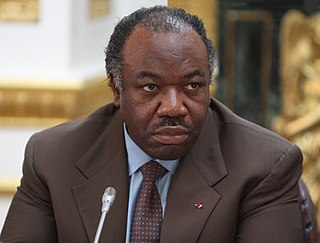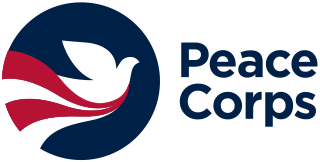Little is known of the history of Gabon prior to European contact. Bantu migrants settled the area beginning in the 14th century. Portuguese explorers and traders arrived in the area in the late 15th century. The coast subsequently became a center of the slave trade with Dutch, English, and French traders arriving in the 16th century. In 1839 and 1841, France established a protectorate over the coast.

Politics of Gabon takes place in a framework of a republic whereby the President of Gabon is head of state and in effect, also the head of government, since he appoints the prime minister and his cabinet. The government is divided into three branches: the Executive (headed by the prime minister, the legislative that is formed by the two chambers of parliament. The judicial branch, like other two branches, is technically independent and equal to other three branches, although in practice, since its judges are appointed by the president, it is beholden to the same president. Since independence the party system is dominated by the conservative Gabonese Democratic Party.

El Hadj Omar Bongo Ondimba was a Gabonese dictator under French control who was President of Gabon for 42 years, from 1967 until his death in 2009. Omar Bongo was promoted to key positions as a young official under Gabon's first President Léon M'ba in the 1960s, before being elected Vice-President in his own right in 1966. In 1967, he succeeded M'ba to become the second Gabon President, upon the latter's death.

The Gabonese Democratic Party, is the ruling and dominant political party of Gabon. Between 1968 and 1990 it was the sole legal party.

Gabriel Léon M'ba was the first Prime Minister (1959–1961) and President (1961–1967) of Gabon. A member of the Fang ethnic group, M'ba was born into a relatively privileged village family. After studying at a seminary, he held a number of small jobs before entering the colonial administration as a customs agent. His political activism in favor of black people worried the French administration, and as a punishment for his activities, he was issued a prison sentence after committing a minor crime that normally would have resulted in a small fine. In 1924, the administration gave M'ba a second chance and selected him to head the canton in Estuaire Province. After being accused of complicity in the murder of a woman near Libreville, he was sentenced in 1931 to three years in prison and 10 years in exile. While in exile in Oubangui-Chari, he published works documenting the tribal customary law of the Fang people. He was employed by local administrators, and received praise from his superiors for his work. He remained a persona non grata to Gabon until the French colonial administration finally allowed M'ba to return his native country in 1946.
Paul Mba Abessole is a Gabonese politician who heads the National Woodcutters' Rally – Rally for Gabon and was a leading opponent of President Omar Bongo during the 1990s. He stood as a presidential candidate twice during the 1990s and also served as Mayor of Libreville, the capital. From 2002 to 2009 he served in the government of Gabon, holding the rank of Deputy Prime Minister for most of that period.

Jean-Hilaire Aubame was a Gabonese politician active during both the colonial and independence periods. The French journalist Pierre Péan said that Aubame's training "as a practicing Catholic and a customs official helped to make him an integrated man, one of whom political power was not an end in itself."

Elections in Gabon take place within the framework of a presidential multi-party democracy with the Gabonese Democratic Party, in power since independence, as the dominant party. The President and National Assembly are directly elected, whilst the Senate is indirectly elected.

Parliamentary elections were held in Gabon on 17 December 2006, although voting in seven seats took places on 24 December 2006 due to logistical problems. The ruling Gabonese Democratic Party (PDG) won 82 seats, with other parties that supported President Omar Bongo winning another seventeen seats, among them the National Woodcutters' Rally of Paul M'ba Abessole with seven seats, the Democratic and Republican Alliance with three seats, the Circle of Reformist Liberals with two seats and the Social Democratic Party with one seat.

Local elections were held in Gabon on April 27–30, 2008, with 1,990 municipal and departmental councillors being elected.

The 1964 Gabonese coup d'état was staged between 17 and 18 February 1964 by Gabonese military officers who rose against Gabonese President Léon M'ba. Before the coup, Gabon was seen as one of the most politically stable countries in Africa. The coup resulted from M'ba's dissolution of the Gabonese legislature on 21 January 1964, and during a takeover with few casualties 150 coup plotters arrested M'ba and a number of his government officials. Through Radio Libreville, they asked the people of Gabon to remain calm and assured them that the country's pro-France foreign policy would remain unchanged. A provisional government was formed, and the coup's leaders installed Deputy Jean-Hilaire Aubame, who was M'ba's primary political opponent and had been uninvolved in the coup, as president. Meanwhile, M'ba was sent to Lambaréné, 250 kilometres (155 mi) from Libreville. There was no major uprising or reaction by the Gabonese people when they received word of the coup, which the military interpreted as a sign of approval.

Paul Marie Indjendjet Gondjout was a Gabonese politician and civil servant, and the father of Laure Gondjout, another prominent Gabonese politician. Gondjout was a member of the Mpongwe ethnic group, and served in the French colonial administration from 1928, and founded the Cercle amical et mutualiste des évolués de Port-Gentil in 1943. He was a delegate to the French Senate from 1949 to 1958, and founded the Gabonese Democratic Bloc (BDG). In 1954, Léon M'ba joined the party and eventually overthrew Gondjout as leader.

The United States Embassy in Libreville, Gabon was bombed on 5 March 1964 and again on 8 March.
Louis-Emile Bigmann (1897–1986) was a Gabonese politician.
André Mba Obame was a Gabonese politician. After serving as an adviser to President Omar Bongo in the 1980s, he was a minister in the government of Gabon from 1990 to 1991 and again from 1997 to 2009; during that time, he was identified with the reformist wing of the ruling Gabonese Democratic Party (PDG). He held the key post of Minister of the Interior from 2006 to 2009 and then briefly served as Minister of the Coordination and Follow-up of Government Action in mid-2009. He was an independent candidate in the 30 August 2009 presidential election and placed third with 25.33% of the vote, according to official results, but he claimed victory and alleged that the PDG candidate, Ali Bongo, won through fraud.
Jules-Aristide Bourdes-Ogouliguende was a Gabonese politician who was the President of the Congress for Democracy and Justice (CDJ), an opposition party. He served as a minister in the government of Gabon from 1976 to 1990 and was President of the National Assembly from 1990 to 1993; from 1993 until his death in 2018.

Early presidential elections were held in Gabon on 30 August 2009. They took place due to the death of incumbent President Omar Bongo on 8 June, after more than 41 years as the sole president of Gabon. While the constitution stated that interim President Rose Francine Rogombé should organise elections within 30 to 45 days, the Constitutional Court accepted the government's request for a delay due to the circumstances.











